- Cognition /
- Clever Dog Lab /
- Current Projects and Publications
Projects
An important question in the study of canine cognition is how dogs understand us humans, given that they show impressive abilities for interacting and communicating with us, which may include an understanding of seeing and knowing.
PI: Ludwig Huber
Funding agency: FWF - Austrian Science Fund
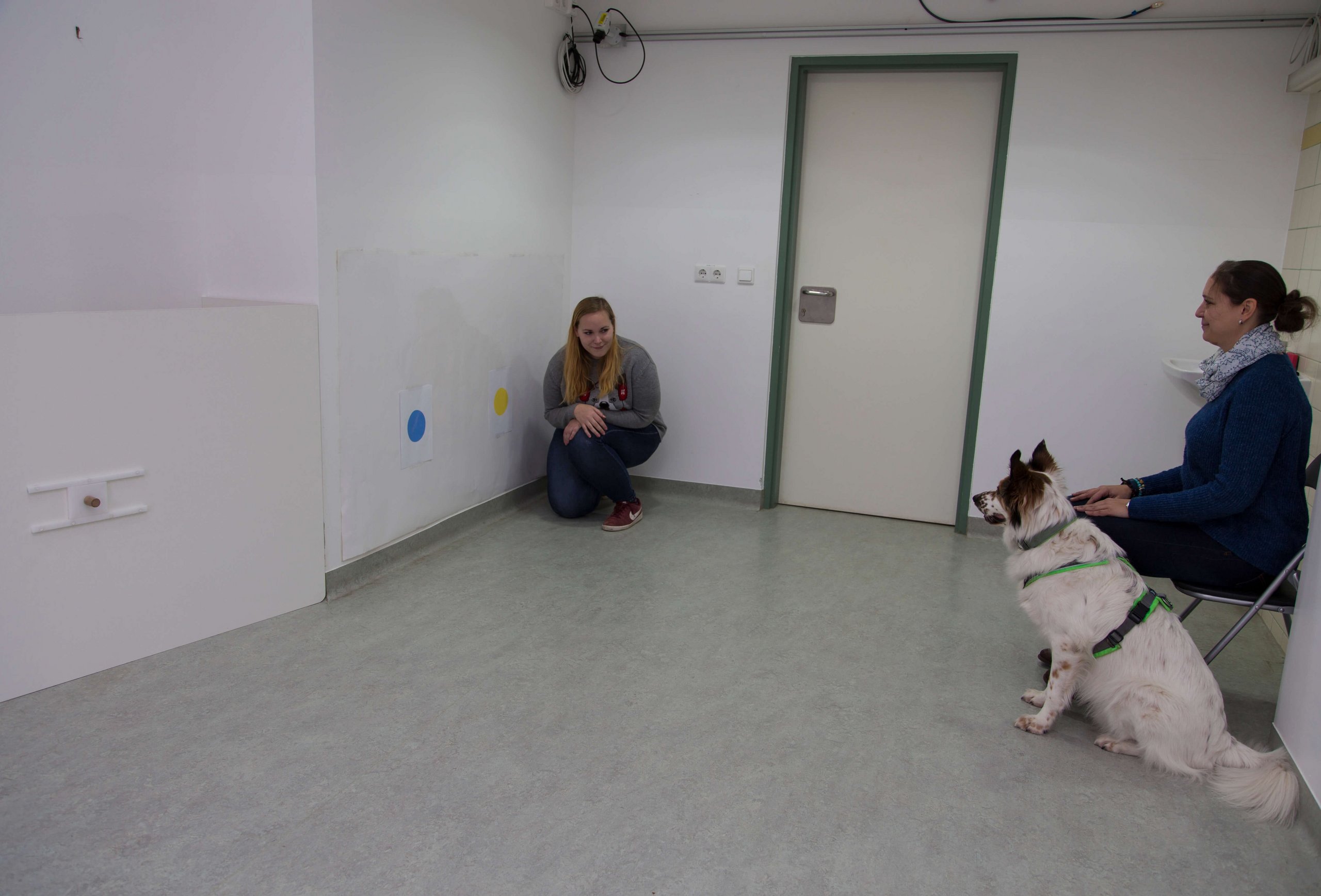
The project, which is being carried out at the CDL, with breeders, at the animal shelter and with dog owners, is dedicated to the phenomenon of overimitation.
PI: Ludwig Huber
Funding agency: FWF – Austrian Science Fund
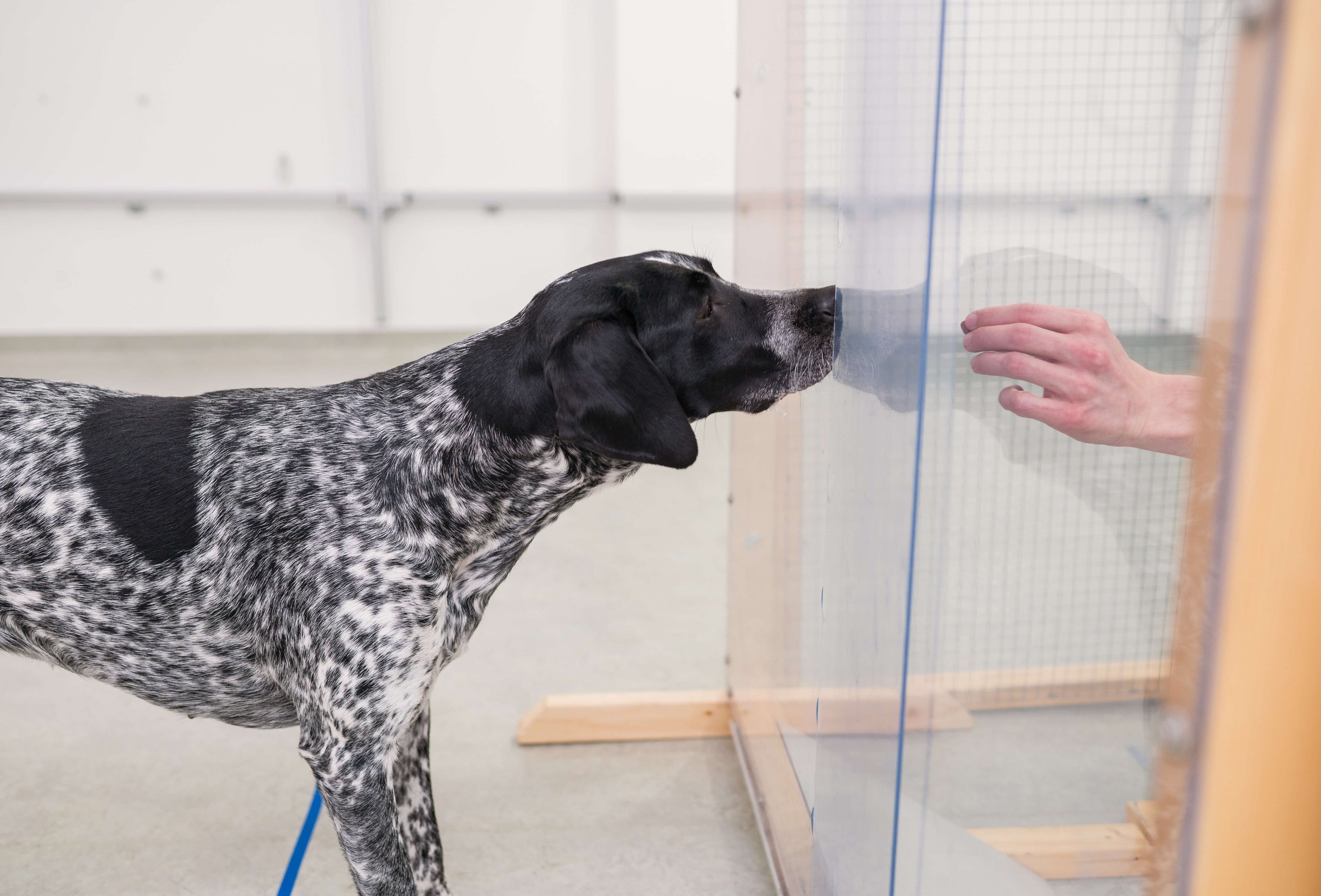
Intention-reading and sensitivity to ostensive signals have a critical role in how humans interact with one another and how we learn and teach. However, we still have a surprisingly limited understanding of the evolution, prevalence and complexity of these abilities among non-human (non-primate) animals. Dogs (Canis familiaris) are a unique model system to address the issue due to their shared evolutionary history with humans.
PI: Christoph Völter
Funding agency: FWF - Austrian Science Fund
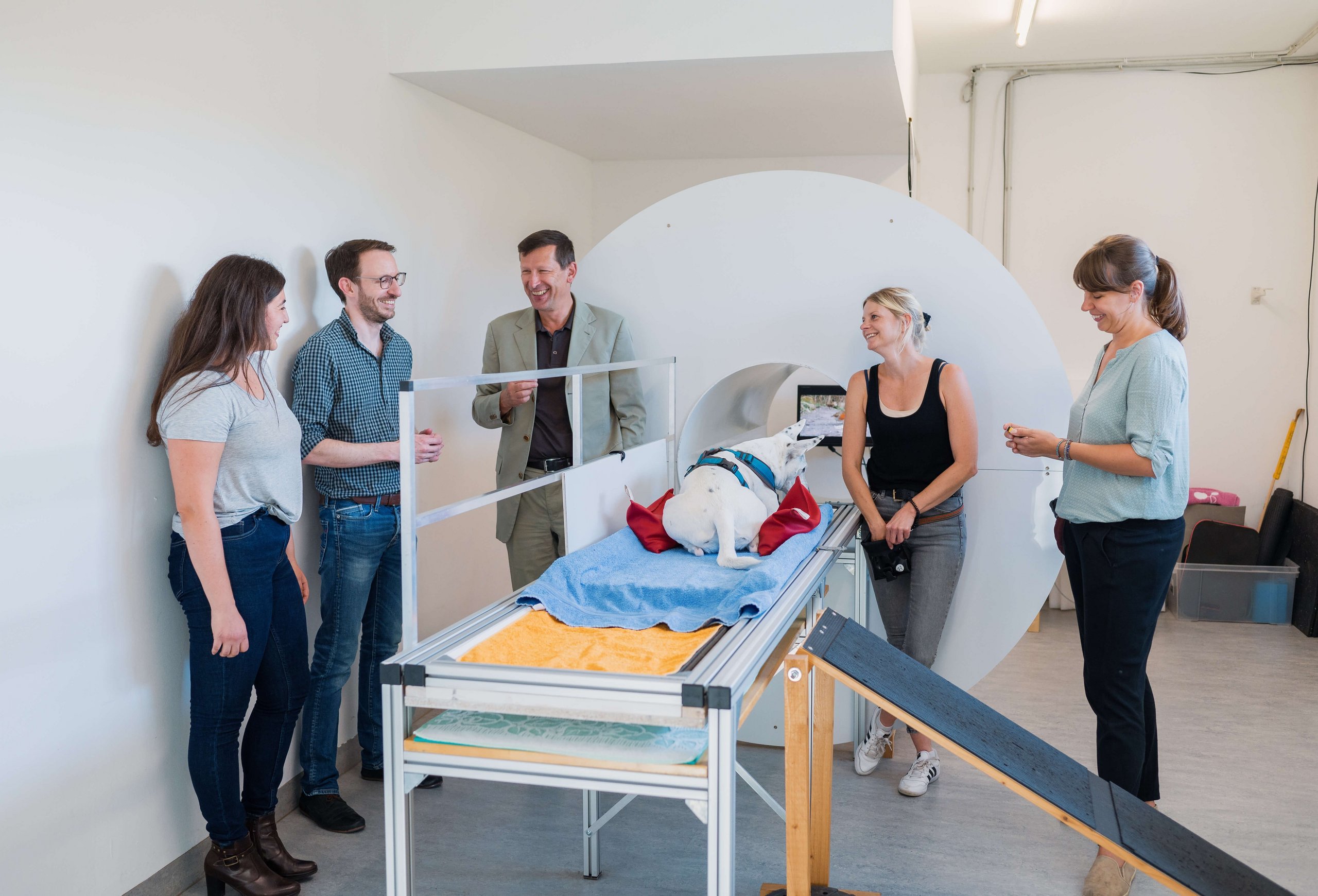
The overarching goal of EVOSOCBRAIN is to pinpoint the brain activities (with fMRI) underpinning how dogs think and feel, and how this fosters their elaborate social skills and strong bonds to humans. Furthermore, we are particularly interested in mechanisms of convergent evolution that lead to complex social cognition and abilities in both dogs and humans (e.g. Theory of Mind). See also: Comparative Canine Neuroimaging Unit
PIs: Claus Lamm (UniVie), Ludwig Huber (Messerli), Christian Windischberger (MUW)
Funding agency: Vienna Science and Technology Funds (WWTF)
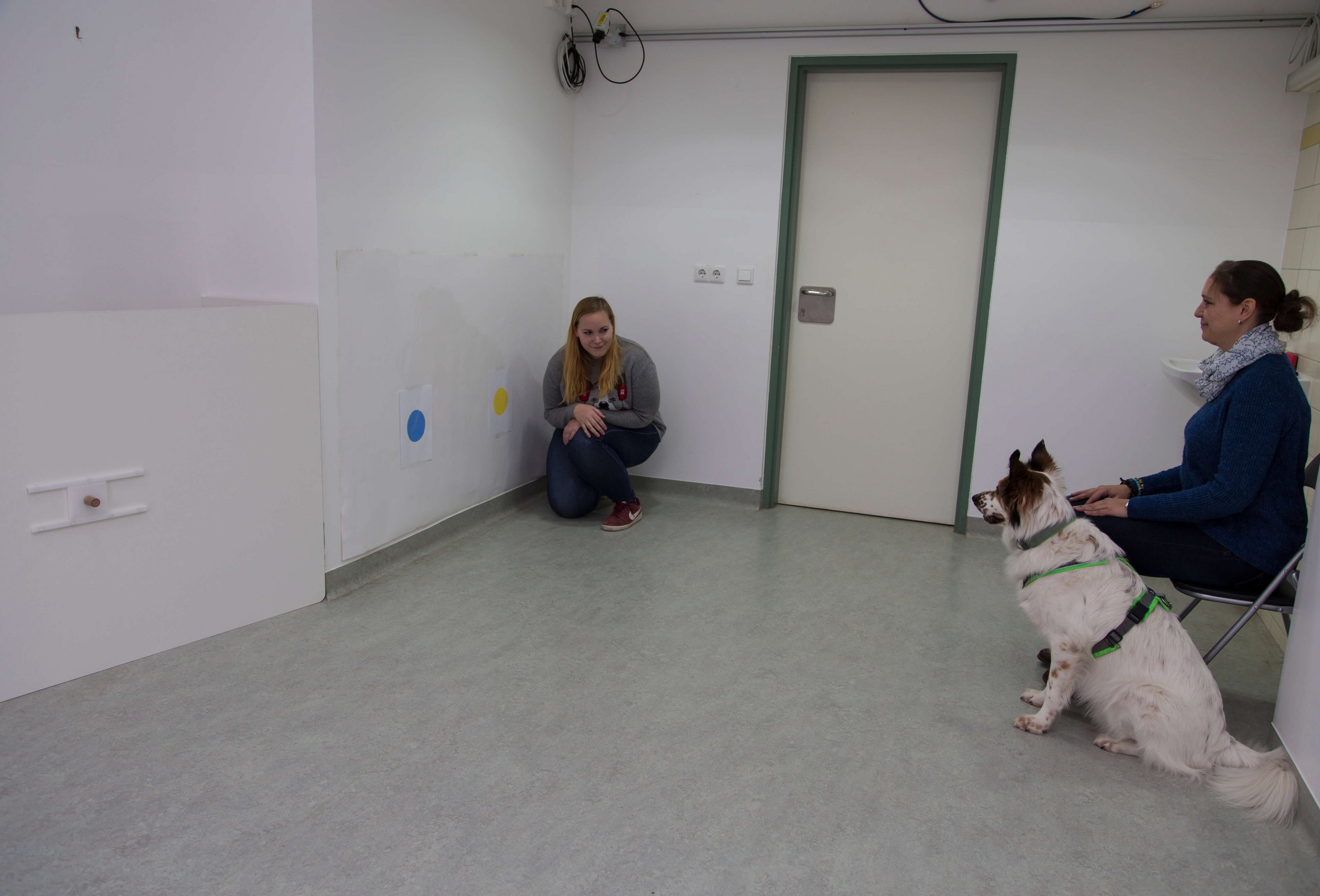
This PhD programme aims at training the next generation of young scientists in cognitive biology, giving them the broad foundation in evolutionary theory, comparative thinking, experimental design, and behavioural analysis. One project, conducted in the CDL (in cooperation with developmental psychologists), will investigate the phenomenon of overimitation in a comparative manner (dogs vs children).
PI at Vetmed: Ludwig Huber
Funding agency: FWF – Austrian Science Fund
ARED aims to explore the origins of human rational thought by comparing how dogs, pigs and human infants form and revise their beliefs. ARED is an interdisciplinary research project between philosophy, cognitive developmental psychology and cognitive ethology, conducted by the University of Stirling and us.
PI at the Vetmeduni: Zsófia Virányi
Funding organisation: UK Research and Innovation
Looking for offers for Master's or diploma thesis topics? Click here for the currently available theses.
The Latest Publications (2020–)
Cimarelli, G; Range, F; Hann, K; Kotrschal, K; Gácsi, M; Virányi, Z(2024): Both humans and conspecifics provide social support to dog and wolf puppies. Animal Behaviour 2024; 209: 129-141
Guran, CA; Lonardo, L; Tünte, M; Arzberger, K; Völter, CJ; Hoehl, S; Huber, L; Lamm, C(2024): Investigating belief understanding in children in a nonverbal ambiguous displacement and communication setting. J Exp Child Psychol. 2024; 240:105830
Lonardo, L; Völter, CJ; Hepach, R; Lamm, C; Huber, L(2024): Do dogs preferentially encode the identity of the target object or the location of others' actions? Anim Cogn. 2024; 27(1):28
Alberghina, D; Bray, EE; Buchsbaum, D; Byosiere, S-E; Espinosa, J; Gnanadesikan, GE; Guran, C-NA; Hare, E; Horschler, DJ; Huber, L; Kuhlmeier, VA; MacLean, EL; Pelgrim, MH; Perez, B; Ravid-Schurr, D [and 4 others](2023): ManyDogs Project: A Big Team Science Approach to Investigating Canine Behavior and Cognition. Comparative Cognition and Behavior Reviews 2023; 18: 59-77
Boch, M; Wagner, IC; Karl, S; Huber, L; Lamm, C(2023): Functionally analogous body- and animacy-responsive areas are present in the dog (Canis familiaris) and human occipito-temporal lobe. Commun Biol. 2023; 6(1):645
Byosiere, SE; Mundry, R; Range, F; Virányi, Z(2023): Selective responding to human ostensive communication is an early developing capacity of domestic dogs. Dev Sci. 2023 26 (4)
Gerwisch, K; Weissenbacher, K; Proyer, M; Huber, L(2023): A pilot study into the effects of PTSD-assistance dogs' work on their salivary cortisol levels and their handlers' Quality of life. J Appl Anim Welf Sci. 2023; 1-13
Guran, CA; Sladky, R; Karl, S; Boch, M; Laistler, E; Windischberger, C; Huber, L; Lamm, C(2023): Validation of a new coil array tailored for dog functional magnetic resonance imaging studies. eNeuro. 2023; 10(3):ENEURO.0083-22.2022
Huber, L; Lonardo, L(2023): Canine perspective-taking. Anim Cogn. 2023; 26(1):275-298
Huber, L; Lonardo, L; Völter, CJ(2023): Eye Tracking in Dogs: Achievements and Challenges. Comparative Cognition and Behavior Reviews 2023; 18: 33-58
Lonardo, L; Völter, CJ; Lamm, C; Huber, L(2023): Dogs Rely On Visual Cues Rather Than On Effector-Specific Movement Representations to Predict Human Action Targets. Open Mind (Camb). 2023; 7:588-607
Mackie, L; Huber, L(2023): Socially priming dogs in an overimitation task. Front Psychol. 2023; 14:1063132
Pali-Schöll, I; Dale, R; Virányi, Z(2023): Dogs at home and at the workplace: effects on allergies and mental health. Allergo Journal International 2023; 32: 138-143.
Riemer, S(2023): Therapy and Prevention of Noise Fears in Dogs-A Review of the Current Evidence for Practitioners. Animals (Basel). 2023; 13(23):3664
Völter, CJ; Lonardo, L; Steinmann, MGGM; Ramos, CF; Gerwisch, K; Schranz, MT; Dobernig, I; Huber, L(2023): Unwilling or unable? Using three-dimensional tracking to evaluate dogs' reactions to differing human intentions. Proc Biol Sci. 2023; 290(1991):20221621
Völter, CJ; Starić, D; Huber, L(2023): Using machine learning to track dogs’ exploratory behaviour in the presence and absence of their caregiver. Animal Behaviour 2023; 197: 97-111
Völter, CJ; Tomašić, A; Nipperdey, L; Huber, L(2023): Dogs' expectations about occlusion events: from expectancy violation to exploration. Proc Biol Sci. 2023; 290(2003):20230696
Huber, L; Kubala, D; Cimarelli, G(2022): Overimitation in Dogs: Is There a Link to the Quality of the Relationship with the Caregiver?. Animals (Basel). 2022; 12(3):326
Karl, S; Anderle, K; Völter, CJ; Virányi, Z(2022): Pet dogs' Behavioural Reaction to Their Caregiver's Interactions with a Third Party: Join in or Interrupt? Animals (Basel). 2022; 12(12):1574
Lonardo, L; Versace, E; Huber, L(2022): Recognition of rotated objects and cognitive offloading in dogs. iScience. 2022; 25(2):103820
Völter, CJ; Huber, L(2022): Pupil size changes reveal dogs’ sensitivity to motion cues. iScience. 2022; 25(9):104801
Lonardo, L., Völter, C. J., Lamm, C., & Huber, L. (2021). Dogs follow human misleading suggestions more often when the informant has a false belief. Proc Roy Soc B 288(1955), 20210906.
Völter, C. J., & Huber, L. (2021). Expectancy violations about physical properties of animated objects in dogs. PsyArXiv.
Cimarelli, G; Marshall-Pescini, S; Range, F; Berghänel, A; Virányi, Z (2021): Relationship quality affects social stress buffering in dogs and wolves. Anim Behav 178: 127-140
Wetzels, S.U., Strachan, C.R., Conrady, B. et al. (2021) Wolves, dogs and humans in regular contact can mutually impact each other’s skin microbiota. Sci Rep 11, 17106.
Cimarelli, G., Schoesswender, J., Vitiello, R., Huber, L., & Virányi, Z. (2021). Partial rewarding during clicker training does not improve naïve dogs’ learning speed and induces a pessimistic-like affective state. Anim Cogn 24(1), 107–119.
Karl, S., Sladky, R., Lamm, C., & Huber, L. (2021). Neural Responses of Pet Dogs Witnessing Their Caregiver’s Positive Interactions with a Conspecific: An fMRI Study. Cerebral Cortex Comm 2(3), tgab047.
Boch, M., Karl, S., Sladky, R., Huber, L., Lamm, C., & Wagner, I. C. (2021). Tailored haemodynamic response function increases detection power of fMRI in awake dogs (Canis familiaris). Neuroimage 224, 117414.
Boch, M; Wagner, IC; Karl, S; Huber, L; Lamm, C (2021): Similarities and differences of face and body perception in the dog (Canis familiaris) and human brain. biorxiv
Völter, C. J., Karl, S., & Huber, L. (2020). Dogs accurately track a moving object on a screen and anticipate its destination. Sci Rep 10(1), 1–10.
Benz-Schwarzburg, J., Monso, S., & Huber, L. (2020). How dogs perceive humans and how humans treat dogs: Linking cognition research with ethical discussions. Front Psychol 11, 584037.
Huber, L., Salobir, K., Mundry, R., & Cimarelli, G. (2020). Selective overimitation in dogs. Learning & Behavior, 48(1), 113–123.
Völter, C., Karl, S., & Huber, L. (2020). Dogs accurately track a moving object on a screen and anticipate its destination. Sci Rep 10(1), 19832.
Völter, C., Lambert, M., & Huber, L. (2020). Do nonhuman animals seek explanations? Anim Behav Cogn 7(3), 446–451.
Karl, S; Boch, M; Virányi, Z; Lamm, C; Huber, L (2020): Training pet dogs for eye-tracking and awake fMRI. Behav Res Methods 52(2):838-856
Chapagain, D; Wallis, LJ; Range, F; Affenzeller, N; Serra, J; Virányi, Z (2020): Behavioural and cognitive changes in aged pet dogs: No effects of an enriched diet and lifelong training. PLoS One 15(9):e0238517
Range, F; Brucks, D; Virányi, Z (2020): Dogs wait longer for better rewards than wolves in a delay of gratification task: but why? Anim Cogn 23 (3) 443-453.
Turcsán, B; Wallis, L; Berczik, J; Range, F; Kubinyi, E; Virányi, Z (2020): Individual and group level personality change across the lifespan in dogs. Sci Rep 10(1):17276
Ujfalussy, DJ; Virányi, Z; et al. (2020): Comparing the tractability of young hand-raised wolves (Canis lupus) and dogs (Canis familiaris). Sci Rep 10(1):14678
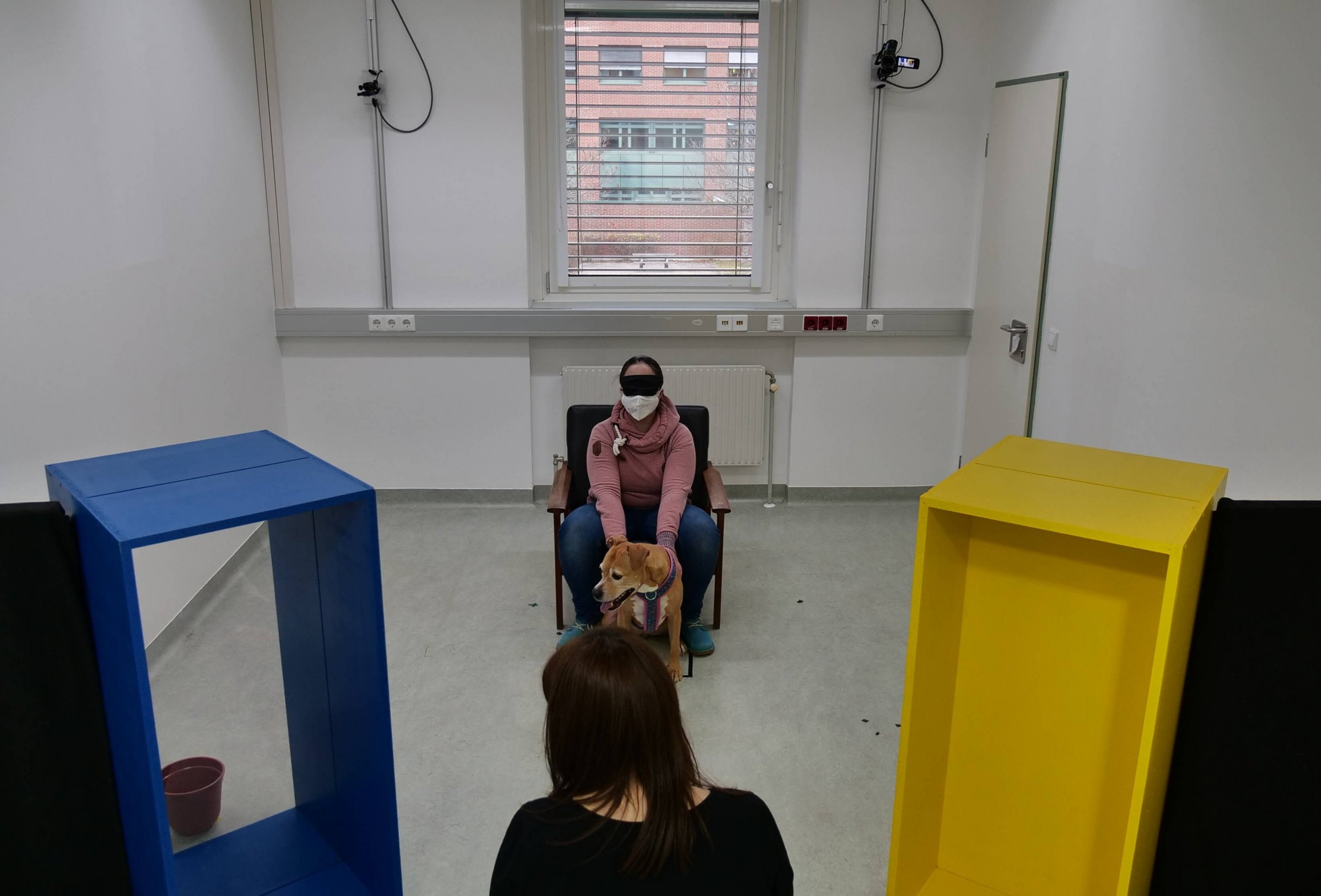
![[Translate to English:] Foto: Marianne Wondrak A dog sits next to a pig in a meadow](/fileadmin/_processed_/b/3/csm_Michel_KuneKune_0332a9c7fc.jpg)
![[Translate to English:] Logo_ARED ARED research group logo](/fileadmin/_processed_/9/0/csm_Logo_663a176c0a.png)